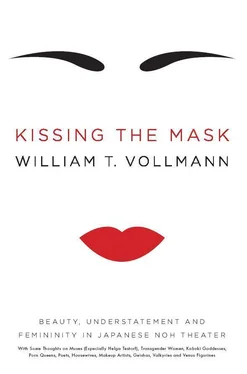(Kawabata, 1934: “For me, love, more than anything else, is my lifeline. But I have the feeling that I have never taken a woman’s hand in mine with romantic intentions.” And perhaps the same is true of life itself, he continues; perhaps he has never taken life by the hand.)
In the Tales of Ise , that nameless courtier-poet whom we think of as Narihira weeps for the capital, and for his beloved there — who may be one or many women. Whenever he woos rural beauties, he condescends (in the archaic sense of the word) to bestow on them the same exquisite courtesies as he would have done for a lady in Kyoto. “Even in the provinces,” the narrator enthuses, “this man did not depart from his customary behavior.” There shines one more indication that someday he will return to the capital. Then all the country maidens he seduced will pine eternally, like Matsukaze and Murasame. As for him, I hope that he will achieve some measure of Kaguyahime’s emancipation from sorrow — although, being a Heian noble, he would surely not forgo that bittersweet, poetic melancholy called aware .
As a spectator of Noh, which is to say a man of the provinces who loves beautiful women (which category includes all women), I am a backwater sort on whom grace has been occasionally bestowed. I want to hold onto my life but cannot. Year by year, it flies away up to the moon. Disobedient to my plans and wishes, my hair has gone grey. I want to keep my loves in my heart’s treasure-box, but those likewise dissolve into moonbeams, either through losses and endings or through familiarity, which is of course a gain as well as a loss, but most definitely a loss! I want to understand every Noh gesture, to recognize each Chinese box of nested textual allusion; but, as I so often complain to you, I will never know either the language or the canon. Even if I could, I could never follow the shite behind the rainbow curtain at the end of the final act. He goes home to the moon, the capital, long lost Kyoto.
What is the capital? For Kawabata it can be signified by red weeping cherry trees, not to mention schoolgirls and maikos. For the lovely concubine in “Yuya” it must be the home of her dying mother. For a certain poet in the Manyoshu , it is youth itself; the sight of it, so he pretends, would restore his best years. For me, so I infer, it is all the women whose love I have lost, and the woman whom I love now and with whom I wish to merge utterly, but cannot, thanks to the abyss between man and woman, soul and soul. Lady Nijo and Lady Sarashina expressed kindred formulations. For Mishima the capital can be reached by means of a homoerotic violent death. For Ono no Komachi, home is youth regained. And now the capital moves to Edo, where pagoda-compounds peer out between golden clouds of ink, and Fuji lords it over the horizon across the bridge all along the avenues of booths and houses, and peering between the shoulder-poles of palanquin-bearers I covetously spy all the many inkstained woodblocks hanging in Edo’s bookshops; lovely ladies sport katsuyama hairdos; I see the heartstopping dark blues of ukiyo-e skies, the courtesans of Yoshiwara; in one theater I am gladdened by the red-outlined eyes of a pale-faced Kabuki beauty; in the next, by a Noh actor in a white and gorgeous mask and a silver-turquoise kimono with gold embroidery; and then another figure, even more fantastic, comes down the bridge in a higher, narrower golden crown, like the first wearing both long dark hair and a golden fan, but its kimono is dark purple and its undergarment is yellow-gold. — Each of us who is the shite perceives the capital in terms of his own attachment. Never mind that; as we glide about within our world’s polished wood, with a stylized pine tree as the backdrop, the chorus will remind you, our audience, what forms our particular delusions take. Here they sit, a half-dozen men, with sharp grey shoulder-winged vests over their black kimonos, and pale medallions over their breasts. In deep, stern, mournful voices, in chorus thrillingly inhuman, they sing a Shinto song.
In exile at Suma, Genji tells his best friend of his fear that he will never glimpse the capital again. As Mr. Mikata once said to me, “Suma’s image is loneliness.” The woman he seduces and impregnates there (she will become one of his less distinguished concubines) torments herself thus: “Born at Akashi! What a hideous thought!”
I was born at Akashi. I will never go to the capital.
Worse yet, I do not want to. When I learn that the Kokin Shu anthology, which first appeared in about 905, walled in for centuries the entire permissible vocabulary of poetic diction, I feel sad and stifled. I would not care to express that sadness only in whichever gestures Noh approves. Were I a woman, I would never choose to be constrained in the garments and gestures of a geisha. I prefer what Mr. Umewaka would call the easy choice.
But the idea of the capital as a heavenly home allures me as much as the fantasy embodied by a maiko or a man in a woman’s mask.
Whenever we seek to peer into our own lives and those of others, we place ourselves in a neutrally perfect imaginary place: the capital. Only there can we discern attachments accurately.
In the ancient times of the Genji Picture-Scrolls there were the fukinuke yatai , the roofless houses, so that we could look in and see in stylized drawings Heian aristocrats diverting themselves. In the seventeenth-century woodblocks made to accompany Saikaku’s tales we could spy on, for instance, the courtesan-turned-letter-writer, who has nearly completed her first column of calligraphy, kneeling beside her customer on the tatami mat while the maid brings a single cup of tea in her left hand. We saw their lives; they could not perceive us; we existed while they were but fictions; they were provincials, and we, residents of the capital.
Or am I dead wrong? We, the audience in the Noh theater, may possess a certain knowingness about the story, which pretends to occur uniquely but which to us may be familiar and more; we may even feel superior to the waki , who fails to recognize the shite in his first humble contemporary manifestation. All the same, we who watch are here to receive and be moved, to be, as the cliché goes, elevated. If anyone is perfect, it is Yuya or Matsukaze, not us. The mask slowly, slowly turns, beautiful, ancient and virginal. It is of the capital, and I am of Akashi. The stage radiates vital superiority in the costumes, gestures, etcetera that it bears. Some of its interest derives simply from its availability to the gaze. From a dark wooden-floored brasserie in Paris I look past the shiny brass railing which is dabbed milk-white with fingerprints, and into the stage beneath the dripping awnings — a street with ripples in the puddles on the white crosswalk, and across it, another red-awning’d café much like the place in which I sit; I see old men gesticulating, married couples slowly eating, pretty girls crossing their long white legs, and I want to watch everything. That girl in the hooded black raincoat paces in the foreground, her pale hand clenched against her ear; she must be talking on her cell phone. She finishes, deposits her hand in her pocket and goes away. Where is the privileged place? My voyeurism makes me forget that the world is in fact not a stage. But the Noh stage is truly a world set apart from mine, an island world in a moat of white stones. And that bridge over which this higher order of beings comes and goes leads not to Akashi, but to that unknown realm behind the rainbow curtain.
Is it the capital or is it something else? The antique treatise of Pound and Fenollosa informs me that the three pine trees besetting that wooden bridge from stage to curtain symbolize, in increasing order of distance, heaven, humankind and earth. Shouldn’t it be the other way around? Why can’t this ape understand?
Читать дальше












